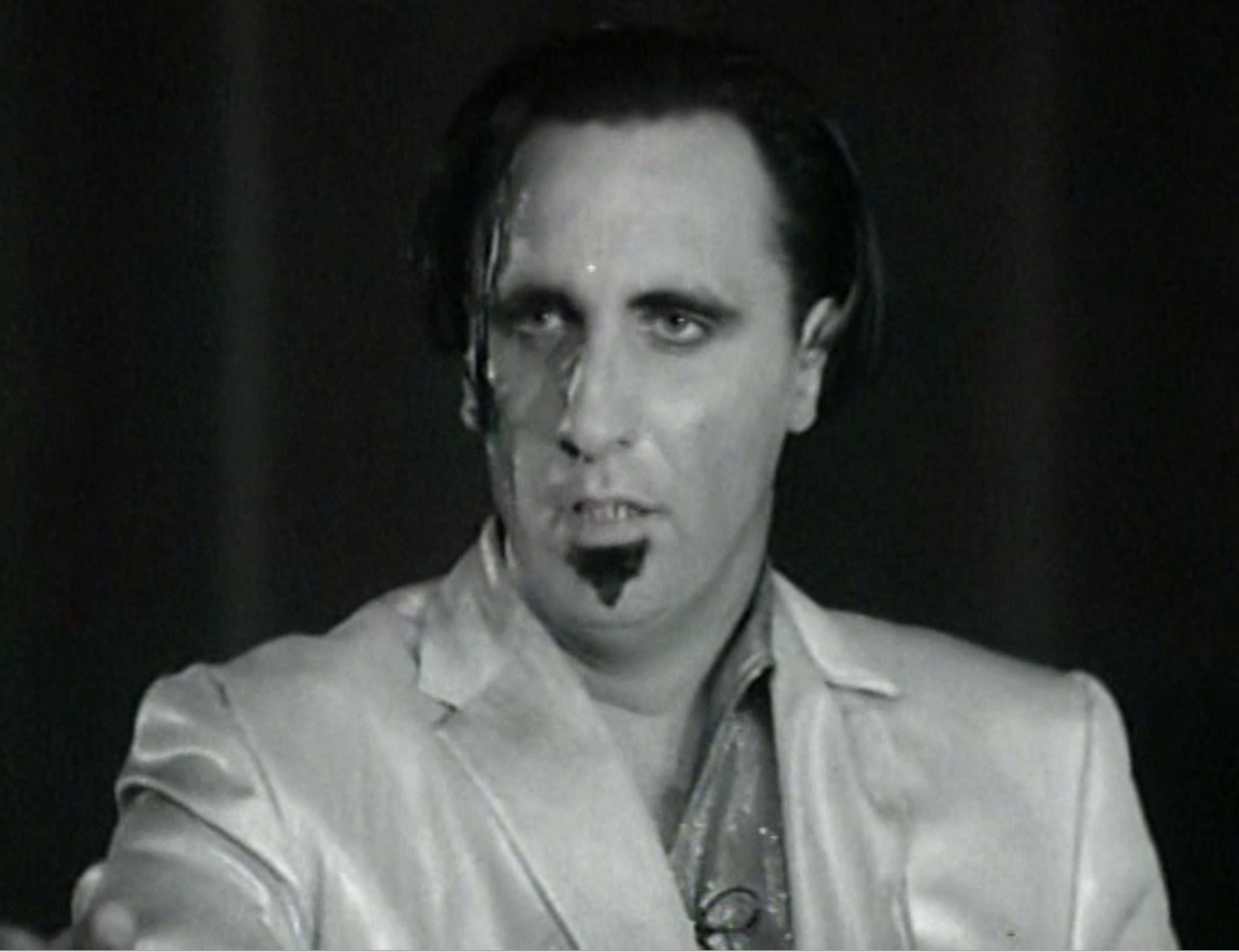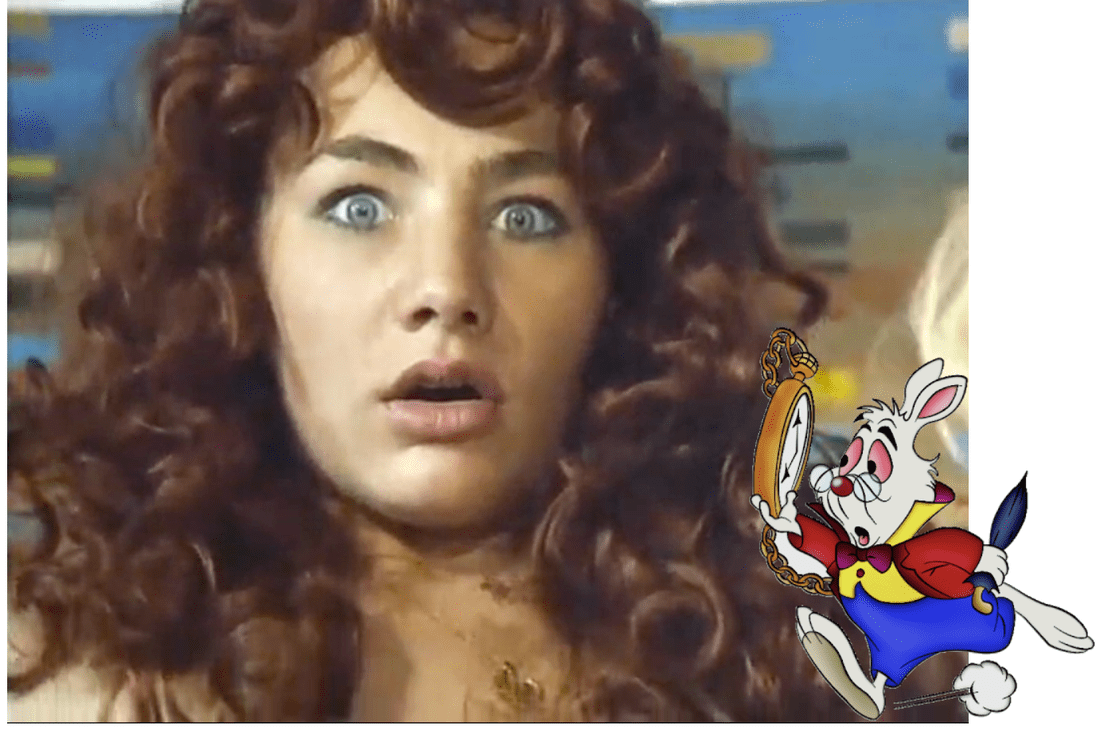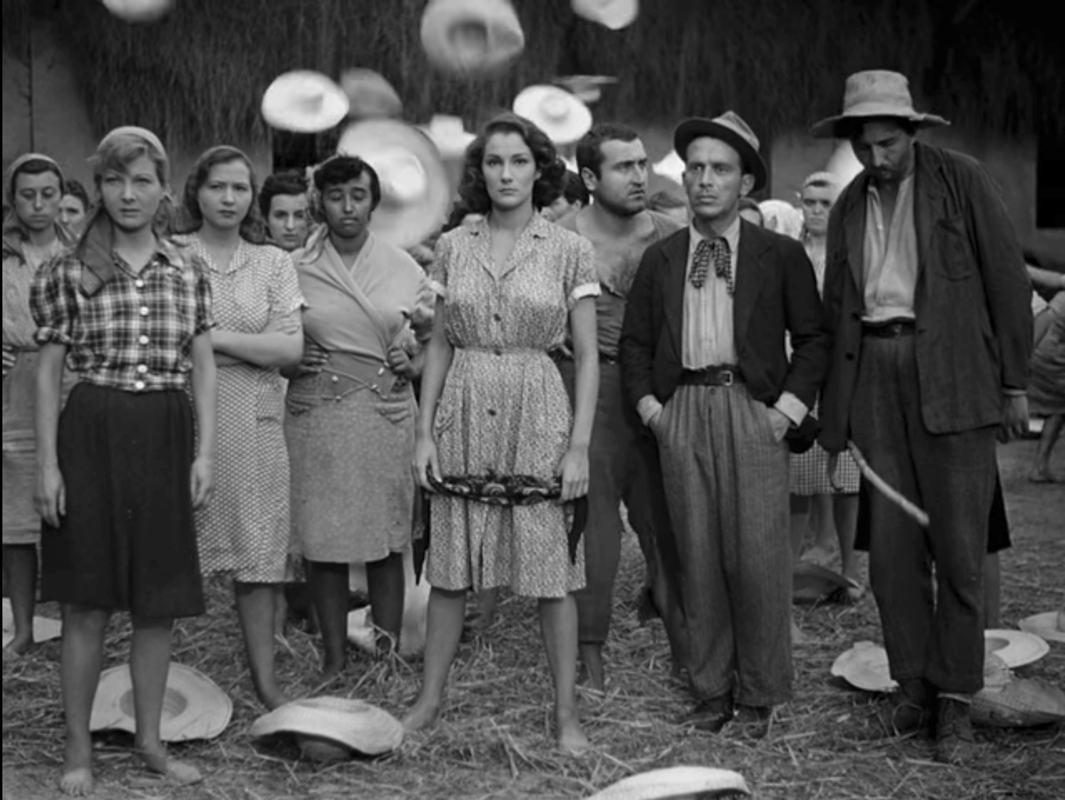
Like Golem (1979) and The War of the Worlds: Next Century (1981), Piotr Szulkin’s O-Bi, O-Ba: The End Of Civilization (1985) is an ugly film. A really ugly film. It is shot in a dark series of catacombs or bunkers, and uses a lot of blue bare bulbs as its light source. Everyone is either backlit into silhouette, or blown out by overexposed flare. Some chambers in the complex are slightly better than others, but the film is unrelenting in its use of harsh light as a means of washing away anything aesthetically pleasing.
Essentially, O-Bi, O-Ba: The End Of Civilization deals with hope. It examines not only how hope functions on a personal, human level, but how it functions as a political and social tool. This is not the dreamy optimistic hope of Hollywood or Christianity. It is a torturous and complex emotion that can drag you to ruin.
O-Bi, O-Ba: The End Of Civilization stars Jerzy Stuhr, who was made famous for his work with Krzysztof Kieślowski on films like Camera Buff and Dekalog. Like Dekalog, O-Bi, O-Ba: The End Of Civilization is often brutal. It is, as the title says, about the end of civilization. We get to witness humanity completely disappear. Instead of everyone trying to escape their final demise, or indulge in one last hug, they gather en masse into a deliriously hopeful rabble and charge toward oblivion, mistaking it for salvation. It’s not at all easy to watch.
Jerzy Stuhr plays a government official named Soft. There isn’t really a functioning government, but there is a small group of men who have convinced themselves that they are in charge. They seem to be the only ones who are fully awake and aware. The rest of what is left of humanity just aimlessly wanders the halls of the underground bunker, slowly starving to death or losing their minds. They are a zombified, sickly horde that just clogs the hallways, swaying back and forth with their heads down. The assumption is that up on the surface, there is nothing left.
Somewhere is a chamber where a librarian dissolves all the books that remain from society into a cellulose powder, and then sprays it down on the crowd for everyone to eat. It is reminiscent of what Russian author Mikhail Bakhtin did with the only manuscript of his book. Poverty-stricken and starving, he rolled the pages into cigarettes and smoked them away, until the book was completely gone, perhaps in an exercise of pragmatism over hope.

Szulkin’s unwashed masses live under some kind of protective dome that is on the verge of collapse, and it is Soft’s job to find the engineer who made the dome and get him to repair it. When Soft finds the engineer, the engineer has no interest in repairing it. He has lost all hope and is calmly resigned to letting the dome collapse, and allowing not only his death, but the death of the human race.

Szulkin presents hope as a vulnerability. Hope makes you weak and fearful, and therefore open to manipulation. It is a kind of Nietzschean view where hope is the last resort of the coward. Instead of facing reality, or what needs to be done, the hopeful invest their energy in passive prayer or optimism. Szulkin makes a point of developing and emphasizing this idea, but he also recognizes that hope is necessary. We, the audience, are frustrated by the engineer’s resignation. He has lost all hope, and with it all motivation to act.
Soft’s job is to manage morale, which is not easy when all that is left of humanity is a thousand people hiding in the darkness of a bunker. At some point in the past, the “government” tried to control the rabble by offering them an inspiring lie. They told them that there was an enormous ark coming to rescue them. The idea was to promote hope, but it backfired. It brought an end to any efforts to make life better. People simply hunkered down and waited.
There had been a small amount of culture and life before the lie. The surviving masses used small metal chits for money. They called them Arks, as if hope was something you could monetize, traffic in, and exchange. As with all money, the little chits were physically worthless and only became valuable when people agreed that they were. It is only faith and/or hope that keeps the world’s monetary system working.
Of course, all of this is a metaphor for the tragic failures of Soviet communism. The promises of equality, plenty, and freedom were just hollow betrayals used to control the populace. O-Bi, O-Ba is simpler than the two films that preceded it. It’s more generalized and abstract and contains fewer elements. Szulkin doesn’t need to create an entire world or render a lot of individual chapters. Almost everyone is simply part of the nameless crowd.
With limited elements and a simplified premise, Szulkin opens up more room for broader interpretations. O-Bi, O-Ba does not focus in on the oppression of Poland as succinctly as Szulkin’s first two films. He uses O-Bi, O-Ba to address the larger issue of why we continue living, and what draws us forward. He examines our penchant for utopias and heavens. He sees both value and danger in these pursuits.
One of the rabble has secretly constructed a bunker within the larger bunker that will withstand the collapse of the dome. He invites Soft in and offers to hide him when the end comes. Excited, the man shows Soft all his preparations, until Soft uncovers a glass tank where the man has frozen two naked prostitutes in preparation for the future. He explains that on the Ark, they will probably have the technology to thaw them out safely.

The poor man has been perverted by hope. If a magic ark is going to save us all, why not believe it can make every dream come true? Szulkin is not just talking about Communist idealism, but religion as well. If you are going to start down the path of believing in talking snakes and a magic man in the sky, what is to stop you from losing all touch with reality?
Szulkin sees both the dangers and the advantages of hope. In a scene where Soft is reporting to his superior, the two argue over why the engineer refuses to repair the dome and save mankind…
Soft: “But he believes that his decision agrees with the faith of those 2,000 people who have come here.”
Leader: “What decision and what faith?"
Soft: “What faith?! The escape into a myth, the escape from, reality, the Ark faith.”
Leader: “There are now not more than 850 people left alive. The remainder have died of cold, dirt, and malnutrition. For none of them even thinks of flushing up the jakes after crapping.”

Faith and shit, that about sums it up. We have the capacity for abstract constructions that we can use to inspire, delude, enlighten, or demean, but we all have to deal with the corporeal reality of our existence.
Soft ends up trying to find a replacement for the Ark fantasy. He is hoping to inspire the people, and through them, the listless engineer. As in Orwell’s 1984, Soft tries to unite them against a common fictional enemy. In 1984, it was Eurasia. In O-Bi, O-Ba, it's the evil Booroos. However, Soft doesn’t manage to pull it off. Everyone continues to cling to the coming of the Ark. Then, Soft discovers a new source of hope. There is a rumor that somewhere in the complex is an airplane, but instead of telling everyone and reigniting their hopes, he keeps it a secret. His search for hope has become personal, but the plane turns out to be an empty, useless hulk, and Soft goes on a frantic search for something else. He finds a child he hopes to save. He finds a huge cache of money. He tries to picture his future with his wife, but nothing works.
Spoilers ahead -
In the end, the dome collapses and light comes flooding in. The horde goes rushing toward the light thinking it is the Ark that has come to save them. It is painfully pathetic. In a morbid delusion, Soft sees himself whisked away by his wife in a hot air balloon. It’s a cruel and bitter end, leaving no room for redemption, and certainly no room for hope.
O-Bi,i O-Ba is very different from Szulkin’s Golem and The War of the Worlds. Both the earlier films are described as science fiction films, but like Orwell’s 1984, they do not fit the genre’s formula very well. Neither Szulkin nor Orwell were building new worlds or imagining new technologies. They were using a fictitious premise as a means of illustrating the world they feared was coming.
O-Bi, O-Ba is much closer to an actual science fiction film. It still serves the same purpose as the others, but by creating a whole new context that takes place in a setting far from our own, Szulkin creates a vantage point from which to discern larger issues about humanity. The further you are away from the subject, the broader your perception becomes.
The War of the Worlds and O-Bi, O-Ba were made in Poland under Soviet enforced martial law. The War of the Worlds was banned upon release, but O-Bi, O-Ba, with its far-out premise escaped the censors.

Ga-ga: Glory to Heroes

Piotr Szulkin’s Tetralogy is not a single narrative cut into 4 sections. O-Bi, O-Ba: The End of Civilization can’t have a sequel. All four films take place in the same arena where the desire for individual identity and autonomy struggle against totalitarian rule, and visually they share a lot in common, but they do not unite into a single narrative.
Szulkin uses many of the same actors in each film, but they never play the same character. See chart below.

If I had to rank Szulkin’s four films, I’d put Golem at the top for its poetic structure and insightful political commentary. O-Bi, O-Ba: The End of Civilization would be second for its efforts toward a broader understanding of humanity and its unique appearance and atmosphere. Ga-ga: Glory to Heroes would come in a distant third. It recaptures some of the elements of Golem, but is unable to make them coalesce into something consistent and insightful. In fourth place, right behind Ga-ga: Glory to Heroes would be The War of the Worlds: Next Century. Of all four films, it is the least creative and the least interesting.
Ga-ga: Glory to Heroes was released in 1985, while Poland was still under Soviet martial law. The other three films do not specify where or when they take place, only that they are set after a nuclear apocalypse. Ga-ga is set on another planet called Australia 458. Numbers feature prominently in all four movies. Numbers are the ultimate abstraction, they are the ultimate tool of depersonalized efficiency. Numbers remove as much individual specificity as possible, in order to make things calculable. In America, we are each given a Social Security Number. Each person has their own unique number, and so is individualized. However,by virtue of being abbreviated and represented by a number, we are all made the same. This dynamic is at the heart of the tetralogy, with the possible exception of O-Bi, O-Ba, which is more generalized.
Ga-ga expresses this dynamic through the lens of heroism. A hero is an individual person, but he is also a universal symbol, an abstraction. In Ga-ga, our hero is named Scope, a criminal who has been shot into space against his will. In the unlikely event that he survives the trip and also manages to find an inhabitable planet, he has been instructed to plant the flag of his country on the surface. In this way, Ga-ga continues the theme of hope set out in O-Bi, O-Ba.
Ga-ga: Glory to Heroes seems to be the only one of the four films that refers to the other three. In Ga-ga, Scope wears the white helmet from Golem. His spaceship is fitted with multiple televisions like in War of The Worlds. Marauding stormtroopers run amok as they did in the first two films. Lastly, there is the continued presence of 8½’s influence, with the quick and gliding dolly shots and the odd entrances of characters from off-screen. In one scene, Scope is given a whip, and the film contains a circus scene that strongly resembles the last scene of Fellini’s film.
Ga-ga returns to some of the poetic resonances that Golem displayed. Scope opens a locker and an arm bursts out and begins strangling him. He tears the arm off and finds a headless body in the locker. The loss of the right arm becomes a recurring theme throughout the film. There are both sculptures and characters missing their right arm, and we witness several more right arms being severed. None of it is directly addressed, but the visual theme hovers like a gesture or a symbol in the background.

The most obvious reference in the film is to Jesus. The three preceding films made tangential references to him, but in Ga-ga, Scope is clearly a sacrificial Jesus figure. He is not holy, or prophetic, but all of Australia 458 is excited to see him get sacrificed. He is to be impaled on a huge pointed pole in a public square. He will be flanked by two other poles, one on either side of him. Two other men will be impaled on those, setting up a visual reference to Christ’s crucifixion.
Fish appear throughout the film as symbols of the ichthys, but there are strange differences between Scope and Jesus. Christ is seen as a savior, Scope is seen more as entertainment. He is called a hero, but the people impale all the heroes they receive from Earth. This is all routine to them. Jesus is seen as a symbol of innocence and purity, but Scope is required to commit a crime, a spectacular and entertaining crime, in order to justify his impalement. In truth, Jesus was required to commit a crime as well, and his crucifixion was also witnessed by a crowd. Both figures were ritualized sacrifices meant to cleanse society and reassure the masses that the government is keeping order.

Michelle Foucault’s book Discipline and Punish came out in 1975, and I’m guessing Szulkin read it. The book centers on the relationship between the mind, the body, and the state. The book opens with a grotesque description of a criminal being drawn and quartered. It’s a graphic depiction of how the state used to exert its power upon the bodies of its subjects. The book goes on to chart the shift from controlling our bodies to controlling our minds.
Jesus himself is a good example of this shift. The Old Testament is exclusively concerned with actions. It allows us to think whatever we want, but there are laws governing our actions. In a chilling shift, Jesus updates this policy when in the Sermon on the Mount, he explains that even thinking about a sin is a sin.
Intimately connected to sin is free will, which is another core issue for Szulkin. Perhaps my favorite part of Ga-ga is when Scope is shoved into the dilapidated rocket and then begins interfacing with the onboard computer. He chooses a face and voice for the video feed and begins following its instructions. At one point, the computer instructs him, “Press the button that corresponds with your free will.” This one sentence sums up so much of Szulkin’s message. It is simultaneously an offer of freedom and a subversive deception to condition and enslave the receiver. It is not enough to submit to communism or authoritarianism. You must want to submit. You must feel as if it is your freely taken choice. It is not enough to refrain from sin, you must not even think of it.

Szulkin lived to see the end of Soviet rule in Poland. When he died in 2018, Poland was a stable democracy, but not without its problems. It is one thing to change a government, it is another to change a culture. Part of the brutality of many communist regimes was their insistence on changing the deep cultural and ideological foundations of the populations they wanted to reform. To whatever extent the Soviets succeeded in these changes, they left behind a fractured and confused society where almost nothing could be relied on. A world where all sincerity was suspect, and the pursuit of truth was all but abandoned.
If there is a fundamental building block of human society, it would have to be trust. What is society other than social bonds based on trust? An attack on these bonds is an attack on our humanity. Szulkin saw this and, conversely, also saw the attack made against individual integrity. It is a series of interlocking paradoxes. To successfully bond as a society, we must sublimate and temper our identities to fit with the whole, but without a sense of individual morality and vision, we cannot be sincere in our actions.

If you enjoyed this article you might also enjoy this -https://filmofileshideout.com/archives/repentance-a-great-film-in-danger-of-disappearing/



